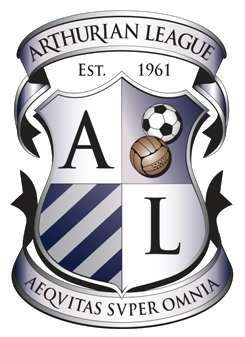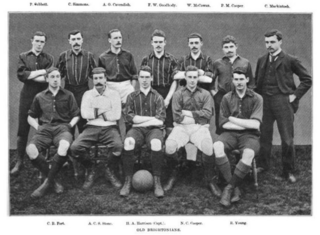Wanderers Football Club was an English association football club. It was founded as "Forest Football Club" in 1859 in Leytonstone. In 1864, it changed its name to "Wanderers", a reference to it never having a home stadium, instead playing at various locations in London and the surrounding area. Comprising mainly former pupils of the leading English public schools, Wanderers was one of the dominant teams in the early years of organised football and won the inaugural Football Association Challenge Cup in 1872. The club won the competition five times in total, including three in succession from 1876 to 1878, a feat which has been repeated only once.

The Old Etonians Association Football Club is an English association football club whose players are alumni of Eton College, in Eton, Berkshire.

Old Carthusians Football Club is an association football club whose players are former pupils of Charterhouse School in Godalming, Surrey, England. The club was established in 1876 and won the FA Cup in 1881, as well as the FA Amateur Cup in 1894 and 1897. The club currently plays in the Arthurian League and have won the 'double' of league and Arthur Dunn Cup in 2006, 2008, 2009, 2011, 2013, 2014, 2015, 2017 and 2019.

The Arthurian League is an English association football league for clubs comprising old boys of public schools. It is affiliated to the Amateur Football Alliance and is not part of the English football league system. It takes its name – via the Arthur Dunn Cup in which all founder members competed – from Old Etonian and England international Arthur Dunn.
The Old Foresters Football Club is an association football club made up exclusively of former pupils of Forest School, located in Epping Forest, Walthamstow, London, England.

The 1876 FA Cup final was an association football match between Wanderers F.C. and Old Etonians F.C. on 11 March 1876 at Kennington Oval in London. It was the fifth final of the world's oldest football competition, the Football Association Challenge Cup. The Wanderers had won the Cup on two previous occasions. The Etonians were playing in their second consecutive final, having lost in the 1875 match after a replay. Both teams had conceded only one goal in the four rounds of the competition prior to the final. In the semi-finals, the Wanderers defeated the Swifts and the Etonians beat the 1874 Cup winners Oxford University.
Hertfordshire Rangers F.C. was a 19th-century English amateur football team based in Watford, Hertfordshire. It competed in the FA Cup and had two players represent England in international matches.
The Old Harrovian Association Football Club, more informally known as the Old Harrovians, is a football club from London, England, for former pupils of Harrow School.
Old Westminsters F.C. is an association football club composed of former pupils of Westminster School, London, England. They play in the Arthurian League.
Derby Junction Football Club were an amateur football club in Derby, England. They were active in the 1880s and 1890s, notably being founder members of the Midland League in 1890 and FA Cup semi-finalists in 1888. They played at Derby Arboretum.
The Old Wykehamist Association Football Club is an English association football club whose players are alumni of Winchester College, in Winchester, Hampshire.
Hendon Football Club was an English association football club from Hendon, today in the London Borough of Barnet, founded in 1876.

Old Brightonians were an amateur association football club, based in London, for the former pupils of Brighton College.

Edgar Lubbock LLB was an English amateur footballer who twice won the FA Cup and played first-class cricket. He later became a partner in the Whitbread Brewery, a director and Deputy Governor of the Bank of England and the Master of the Blankney Foxhounds.
Gitanos Football Club was an English association football club and one of the first members of the Football Association.
Redcar and Coatham Football Club was a football club based in Redcar, England.
Lower Darwen F.C. was an English association football club from the village of Lower Darwen in Lancashire.
Darwen Old Wanderers F.C. was an English association football club from the town of Darwen in Lancashire.
Old St Mark's Football Club was a football club based in Barnes, London.
Charles Edward Farmer was a footballer and solicitor, who won an FA Cup runners-up medal.





